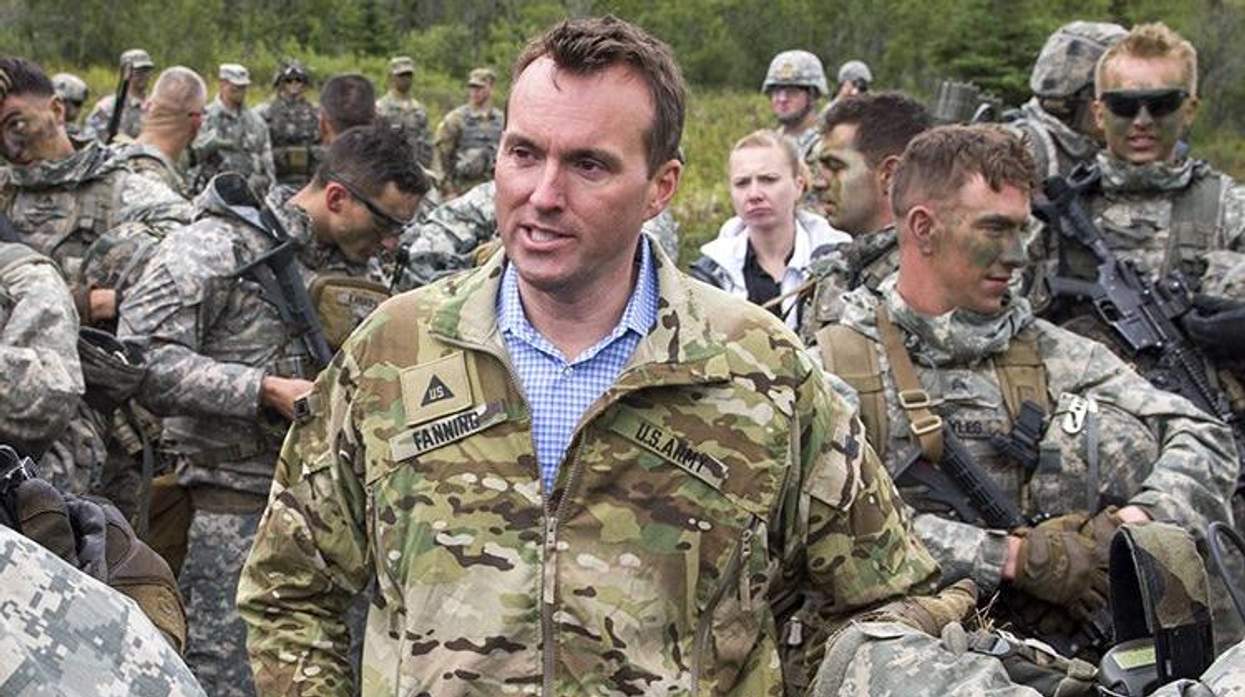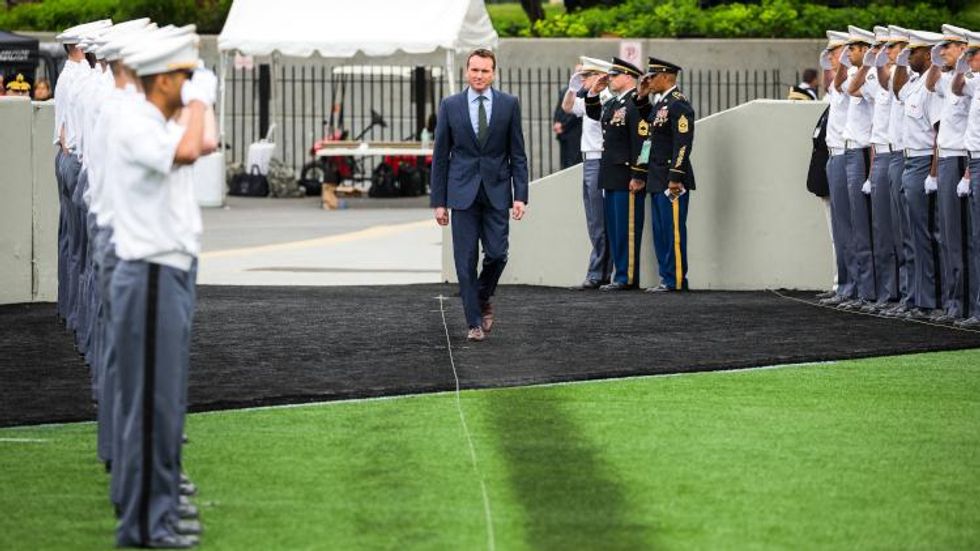When I finally got the news that Transportation Secretary Pete Buttigieg became the first gay Cabinet member in history to be confirmed by the United States Senate, I was surprised at my reaction. I didn't feel the elation that I supposed would occur; instead, it was perhaps a feeling of wanting more?
Granted, we knew this moment was coming when, on December 16 of last year, then President-elect Biden designated the-then simply titled "Mayor Pete" to be the first gay Cabinet member (I don't want to hear about the former Acting Director of the DNI.). When Biden won the election, we all suspected that Mayor Pete would have a prominent role in the administration. After all, he was one of the most impressive candidates running for the Democratic nomination last year.
After Buttigieg won the Iowa caucus last March, I wrote about Mayor Pete being a winner, particularly for our community, and ended the column by predicting that on Tuesday, November 7, 2028, we would have a President-elect Buttigieg. I'm going to stick to that.
Are my expectations for Pete too high that when he was finally confirmed, I felt a bit nonchalant? That something was missing? That my reason for not jumping up and down was because the Cabinet position was a mere consolation prize? As someone who has admitted living vicariously through Pete, did I still feel a bit empty because he didn't win the presidency like I always dreamed that I would? The six-year-old boy who could recite all the presidents, because he would be one someday; the very young man who went to work on Capitol Hill, still with the goal of becoming president, but then like a wave, his sexuality washed over him, and washed away any hope, or chance, that he would be elected president. Now, at 56, the middle-aged man waits for Pete to achieve his dream. Will the old man live to see it happen, and be able to jump and down?
After I got to thinking about the consequence of Pete becoming Secretary Buttigieg, I realized that I, or any of us, cannot take this moment for granted. This is a monumental achievement. A small-town, midwestern boy, with similar dreams as mine, grew up to be a proud gay man, and is now called Mr. Secretary.
Eric Fanning grew up in a small town in the Midwest, Kalamazoo, Mich., and, like me, he worked on Capitol Hill during the early 1990s, as an aide on the House Armed Services Committee. Our paths surely crossed at some point. More on that later.
He then followed the chairman of that committee, Les Aspin, to the Defense Department after President-elect Bill Clinton named Aspin as his first Secretary of Defense. Fanning, would go on to become a secretary himself, the first openly gay head of any service in the U.S. military, when he was nominated by President Obama to be Secretary of the Army, and confirmed by the U.S. Senate in 2016.

While he was not a Cabinet member, Fanning's tenure is surely a high-water mark in the history of the LGBTQ+ movement, perhaps icing on the cake after the repeal of "Don't Ask, Don't Tell," and the lift on the ban of gays and bisexuals serving in the military by Obama.
I reached out to Fanning, and my first question was more about validating why I'm not shedding tears of joy at the sound of Secretary Buttigieg. "Well, if it makes you feel better, maybe that's a good sign," he reassured. "What it means is that we have collectively broken through so many barriers, not just myself, but look how many LGBTQ people have been elected to public office around the country."
But he also raised another very important point. "While all of this is exciting, our community is not monolithic, and we have work to do in our community to help bring up so many who are struggling. It's great to celebrate the accomplishments, and our successes are adding up; however, a large part of our community is still hurting. But each time we knock down a barrier, we open the door wider and wider for others who are striving to succeed."
How big a deal is it having a gay cabinet member? "It's great," Fanning exclaimed. "I do believe we are getting to the post-first era. Frankly, this should have been something we have crossed already. But it is exciting. I actually think the bigger barrier he broke was being a viable presidential candidate."
And here we are, back to that boy's childhood dream. Did Fanning ever wish to become president of the United States too? "I went through a few iterations of what I wanted to be," he remembered. "In college I wanted to be an architect. And then I worked in the first presidential primary in New Hampshire in 1988, and I got the bug.
"When I first got the interest, and my first job on Capitol Hill, I did aspire to run for office, and I was like you at the time; I didn't think I could do both, be openly gay and be a political candidate. When you're in that world, you do think about becoming president. Now, running for office is so divisive, there's so much money involved. It's a real grind and being gay really a isn't a big deal anymore."
Was there more pressure on Fanning because he was the first gay head of a military branch? Did he bring a different perspective because he was gay? "By the time I became Secretary of the Army, it was public knowledge that I was gay," he recalled. "I had a couple of jobs before that, and one was as acting Secretary of the Air Force, so that got some attention at the time because of the fact that I was a 'first' as a gay man.
"I spent 12 years of my life coming up rung by rung through the Defense Department and knew of all the machinations inside the building. They all knew me, and they also knew that I had deep institutional experience. So, I didn't feel pressure so much as just an opportunity. I was honored to be able to have that chance to help other people imagine that they could do things they thought they couldn't do.
"Looking back, anybody who is different will be criticized, so by the time the Secretary of the Army position came up, I had a pretty thick skin, and quite frankly the support was overwhelming. You don't know how much support is out there, until something like this happens, and it's a very uplifting experience."
Working on the Hill was an uplifting experience for both of us. We reminisced on being young, closeted gay men working in Congress, burning the midnight oil, and burning through many beers at a former Capitol Hill mainstay, the Tune Inn. Turns out a very difficult waitress who worked there, and who made it clear she wasn't there to make friends, loved us both. We had a good laugh about that, and then asked the same question, "Whatever happened to her?"
I don't think anyone will be asking that question about Fanning, or Secretary Buttigieg for that matter. Each of the secretaries have a bright road ahead, blazing it for all those behind them, and all those who dreamed of being president - or a secretary in a presidential cabinet.
As a former secretary, I asked Fanning if he had any advice for the new Secretary Buttigieg. "I think he's done quite well, so why would he need advice from me?" Fanning joked. "The more honest you are about who you are, the happier you're going to be and the more successful you're going to be, and Pete is the embodiment of this.
"One of the great things I learned during my tenure was to serve with integrity, and I think Secretary Buttigieg will excel at that. His biggest challenge, even for me, was just understanding how to manage a large bureaucratic organization; however, he's a very smart guy, and he's surrounded by other very smart people, so he should do quite well."
And, if that's the case, then this middle-aged man should live to see Secretary Buttigieg break down the ultimate barrier for all of us. There will never be a President Casey, but hope springs eternal that, in my lifetime, there will be a President Buttigieg. And when that happens, I know I'll be jumping up and down.
John Casey is editor at large for The Advocate.






































































Charlie Kirk DID say stoning gay people was the 'perfect law' — and these other heinous quotes